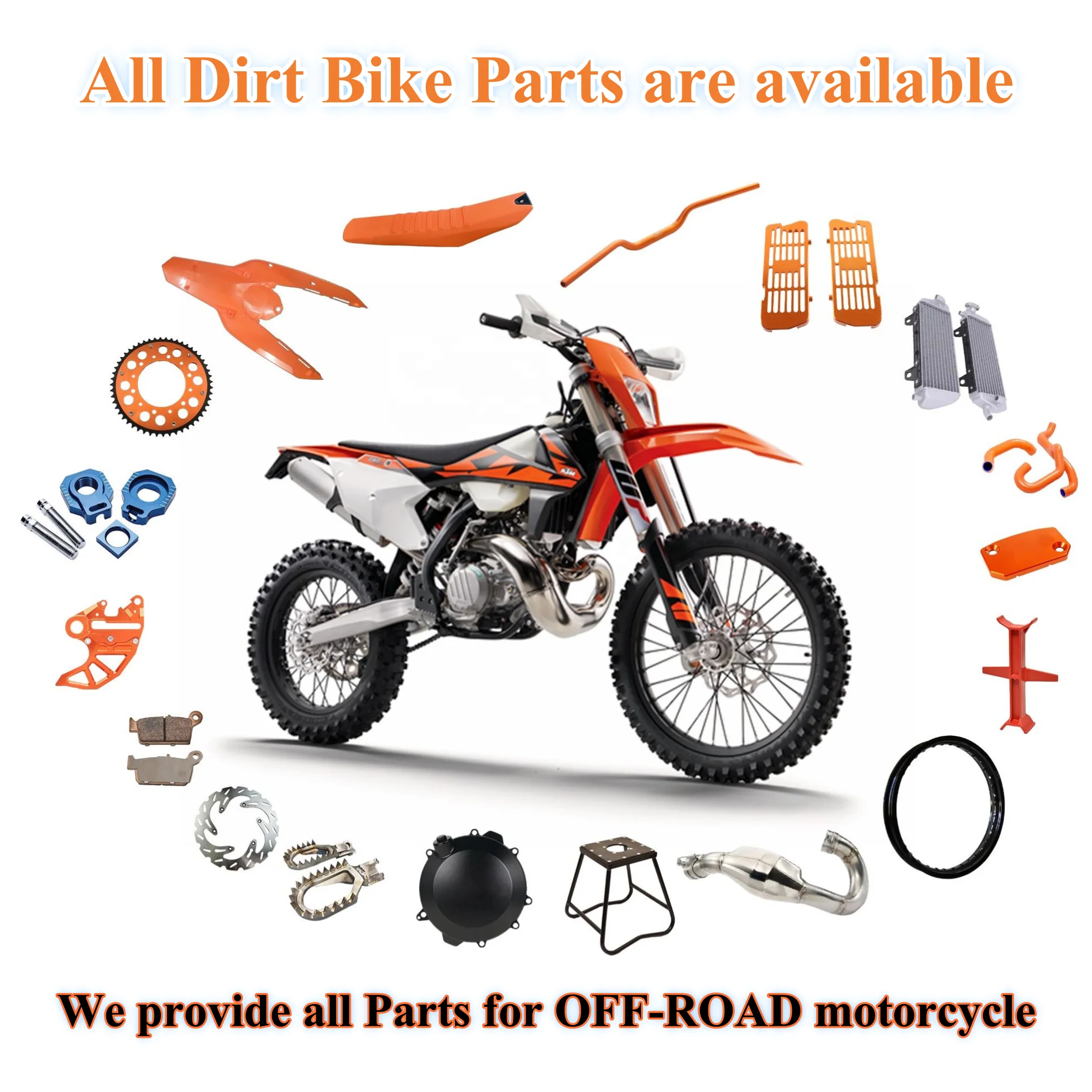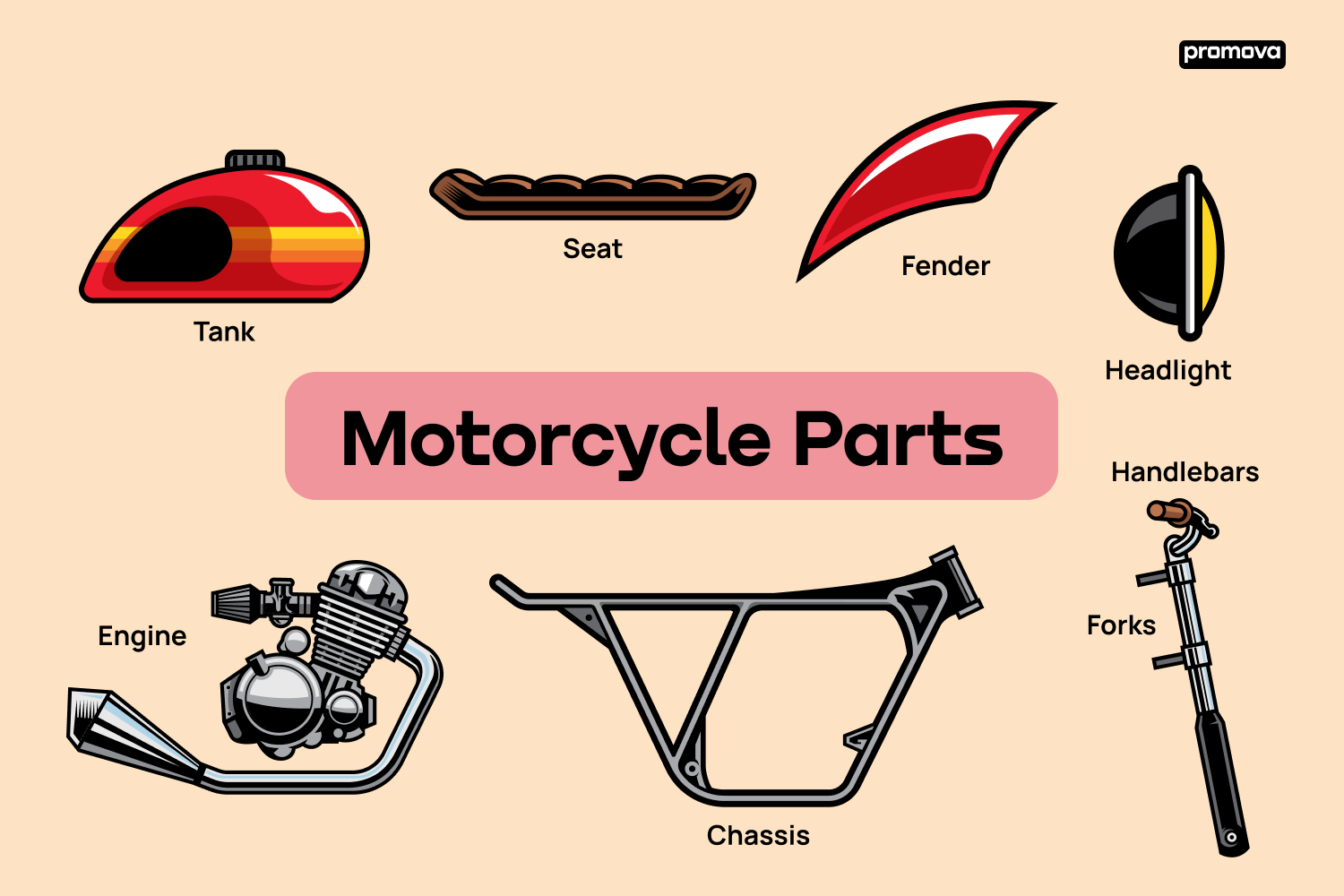Discover the Necessary Motorcycle Components You Need for Optimal Efficiency
Recognizing the important parts of a motorcycle is basic for attaining peak performance. Each component, from the engine to the stopping system, plays a critical function in general capability and safety. Normal maintenance can stop unanticipated failings and enhance the riding experience. Lots of motorcyclists forget the intricacies of these systems. Discovering how they work with each other can result in a much more effective experience. What vital parts should every cyclist focus on?
The Engine: The Heart of Your Bike
The engine offers as the core part of a bike, driving its efficiency and specifying its abilities. It is in charge of transforming gas right into mechanical power, which powers the bike onward. Different kinds of engines are utilized, including single-cylinder, V-twin, and inline setups, each offering unique features fit for different riding designs and objectives. The engine dimension, typically determined in cubic centimeters (cc), considerably influences performance, with bigger engines normally giving more power and torque.Furthermore, the engine's layout and modern technology, such as fuel injection systems or air-cooling versus liquid-cooling, impact effectiveness and integrity. Upkeep is vital for peak operation; variables like normal oil changes and checking spark connects warranty longevity. Bikers commonly think about an engine's responsiveness and smoothness, as these qualities enhance the general riding experience. Ultimately, the engine stays a crucial element that defines not only the bike's efficiency but likewise the motorcyclist's connection to the equipment.
The Transmission: Changing Gears Efficiently
The transmission plays a vital function in a motorbike's performance, particularly in the auto mechanics of gear moving. Recognizing how to shift gears smoothly can boost the overall riding experience, while normal upkeep warranties peak functionality. Proper interest to these aspects can greatly impact the longevity and effectiveness of the bike.

Equipment Shifting Mechanics
Smooth equipment shifting is necessary for perfect motorbike performance, greatly impacting both velocity and control. The mechanics of equipment shifting include the communication in between the clutch, equipment lever, and transmission system. When a motorcyclist involves the clutch, it disengages the engine from the transmission, enabling a gear adjustment without damaging the parts. A well-timed launch of the clutch, incorporated with specific movement of the equipment bar, promotes a seamless modification in between equipments. This procedure guarantees that the engine runs within its finest power band, boosting efficiency. Oem Parts New Zealand. Furthermore, recognizing the gear proportions and their effect on speed and torque can help cyclists make notified choices during changes, inevitably adding to a more delightful and responsive riding experience
Maintenance Tips Importance
Routine maintenance plays a vital role in assuring that the transmission system runs successfully, enabling smooth gear changes. Frequently inspecting and changing the transmission fluid is crucial, as old liquid can lead to boosted rubbing and wear. Furthermore, examining the clutch for wear guarantees peak involvement and disengagement, stopping slippage during gear changes. Lubrication of relocating parts is similarly vital to reduce rubbing and enhance efficiency. Motorcycle owners ought to likewise keep an eye on for leakages and uncommon sounds, as these can suggest underlying concerns. By adhering to these maintenance ideas, cyclists can extend the lifespan of their transmission system, ensuring that gear changes continue to be seamless and adding to the general performance of their motorbike.
The Braking System: Ensuring Safety And Security on Every Adventure
Braking systems are essential elements that straight influence a motorbike's safety and security and efficiency. They are composed of various parts, including brake pads, blades, calipers, and hydraulic lines, all collaborating to assure effective slowdown. The kind of braking system-- commonly either disc or drum-- affects responsiveness and stopping power.Regular upkeep is important to support peak efficiency; worn brake pads can result in lowered performance and boosted quiting ranges. In addition, the top quality of brake liquid must be monitored, as it can take in moisture gradually, endangering stopping efficiency.Riders must also think about the importance of anti-lock braking systems (ABS), which prevent wheel lockup throughout sudden quits, boosting overall security. Correctly working brakes are not almost stopping; they infuse confidence in the biker, enabling more secure navigation through various terrains. Ultimately, a dependable stopping system is vital for taking pleasure in every ride with comfort.
The Suspension: Enhancing Comfort and Control
A well-functioning suspension system greatly adds to a motorcycle's total efficiency, matching the efficiency of the braking system. The suspension plays a substantial duty in soaking up shocks from unequal surfaces, assuring a smoother adventure while maintaining tire contact with the roadway. This call is necessary for both security and control, permitting motorcyclists to browse edges with self-confidence and precision.Different sorts of suspension systems, such as telescopic forks or mono-shocks, provide differing levels of comfort and handling. Correctly tuned suspension enhances responsiveness, providing the motorcyclist with a more connected feeling to the motorcycle. Routine upkeep checks are very important to identify the suspension parts, including springtimes and dampers, are functioning at their best. An efficient shock absorber not just elevates the riding experience yet also adds to the longevity of various other motorcycle parts by decreasing wear and tear. Because of this, buying quality suspension is crucial for any significant motorcycle lover.
The Tires: Linking You to the Roadway
Tires play a crucial role in a motorcycle's efficiency, acting as the main link in between the motorcyclist and the roadway. Comprehending the different kinds of tires offered can considerably affect taking care of and security. Furthermore, routine maintenance is vital to ensure peak tire efficiency and durability.
Tire Types Explained
How do different tire types influence a look what i found motorbike's performance? Tire kinds play a crucial duty in figuring out a motorbike's security, grasp, and handling. Sporting activity tires, made for high performance, offer boosted grip and responsiveness on smooth roadways, making them excellent for competing and aggressive riding. Conversely, exploring tires prioritize longevity and convenience, providing a smoother experience for long-distance travel. Off-road tires, defined by their rugged tread patterns, master traction on unpaved surfaces, appropriate for adventure fanatics. Furthermore, dual-sport tires mix characteristics from both on-road and off-road categories, satisfying functional riding needs. Ultimately, choosing the best tire type is necessary for maximizing performance, making sure security, and enhancing the total riding experience.
Upkeep Tips Offered
While riding when traveling, keeping perfect tire condition is important for safety and security and performance. On a regular basis checking tire stress is essential, as under-inflated tires can lead to bad handling and enhanced wear. It is a good idea to inspect tread depth often; worn tires concession grip and stability. Additionally, cyclists should search for indicators see it here of damage, such as splits or bulges, which can show the demand for substitute. Rotating tires regularly assures also use, enhancing longevity. Keeping tires clean from particles and staying clear of too much aesthetics can prolong their lifespan. Maintaining appropriate positioning and equilibrium contributes to peak performance, decreasing stress on various other bike components. Adhering to these upkeep ideas will considerably improve the overall riding experience.
The Gas System: Fueling Efficiency and Effectiveness
The gas system plays an important duty in optimizing a motorbike's efficiency and effectiveness, as it guarantees the optimum distribution of fuel to the engine. It consists of a number of important parts, consisting of the fuel tank, gas pump, gas filter, and gas injectors or carburetor. Each part must work successfully to guarantee a powerful and smooth ride.The gas container shops gas and provides it to the engine via the fuel pump, which generates the needed stress. A fuel filter avoids pollutants from going into the engine, while the injectors or carburetor mix gas with air for combustion.Proper maintenance of the gas system is critical; a clogged up filter or malfunctioning injector can lead to reduced performance and increased fuel intake. By validating that the fuel system operates successfully, motorcyclists can take pleasure in improved throttle response, better fuel economic situation, and in general boosted riding experience.
The Electrical System: Powering Your Adventure
A reliable electric system is essential for the general capability and security of a motorcycle, as it powers crucial elements such as the ignition, lighting, and numerous electronic systems. This system consists of the battery, which stores energy, and the alternator, in charge of generating power while the engine runs. The electrical wiring harness attaches these parts, making sure dependable power distribution.Additionally, fuses protect the system from overloads, while relays assist regulate high-current gadgets with low-power signals. A well-kept electric system boosts performance by ensuring smooth beginnings and regular operation of signals and lights, crucial for motorcyclist exposure and safety.Regular checks of the battery's fee and connections are essential for stopping electrical failures. Bikers need to likewise check wiring for damage, making sure all components work preferably. Eventually, a durable electric system adds considerably to the total efficiency and reliability of the motorbike.
Often Asked Inquiries
Exactly how Usually Should I Change My Motorbike's Battery?
The frequency of motorcycle battery replacement depends upon use and upkeep (Motorbike Components NZ). Generally, batteries should be changed every three to 5 years. Routine checks can assist identify when a substitute is necessary for peak performance
What Tools Do I Need for Fundamental Motorcycle Maintenance?
For standard motorbike maintenance, one calls for important tools such as an outlet collection, wrenches, screwdrivers, pliers, tire stress scale, and a torque wrench. These tools help with effective read this post here maintenance and assure the motorbike runs successfully and safely.
Exactly How Can I Improve My Motorcycle's Aerodynamics?
To enhance motorbike aerodynamics, one need to take into consideration readjusting fairings, making use of windscreen extensions, optimizing body position, and reducing general weight. These adjustments assist minimize drag, boosting stability and gas efficiency throughout trips.
What Are the Indications of a Failing Electrical System?
Indicators of a failing electrical system include dimming lights, trouble starting, uneven instrument analyses, and blown fuses. Motorcycle Spares Christchurch. Uncommon scents or corrosion around battery terminals might also show underlying problems needing immediate attention for safety and security and performance

How Do I Pick the Right Oil for My Motorcycle?
When choosing oil for a motorbike, one need to take into consideration the producer's specifications, thickness scores, and the sort of riding. In addition, synthetic versus conventional oil can influence efficiency and engine protection, influencing the choice considerably. The engine size, generally gauged in cubic centimeters (cc), significantly influences efficiency, with bigger engines normally providing even more power and torque.Furthermore, the engine's style and modern technology, such as fuel shot systems or air-cooling versus liquid-cooling, affect effectiveness and integrity. A well-functioning suspension system substantially adds to a motorbike's overall efficiency, enhancing the efficiency of the stopping system. The fuel system plays a vital duty in optimizing a motorcycle's performance and performance, as it guarantees the ideal delivery of gas to the engine. A gas filter stops impurities from going into the engine, while the injectors or carburetor mix fuel with air for combustion.Proper upkeep of the gas system is important; a clogged filter or malfunctioning injector can lead to lowered efficiency and enhanced gas intake. A well-maintained electric system enhances performance by guaranteeing smooth starts and constant procedure of signals and lights, essential for motorcyclist visibility and safety.Regular checks of the battery's charge and connections are important for protecting against electrical failings.